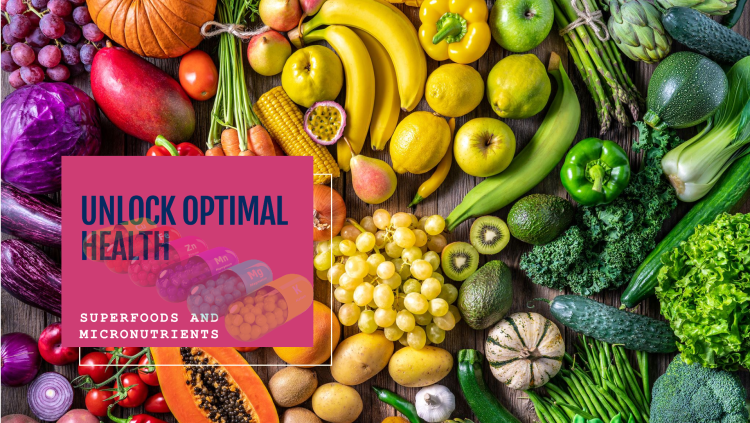Superfoods and Micronutrients: Unlocking Optimal Health
In today’s wellness-focused world, “superfoods” are often hailed as the superheroes of nutrition. But what truly sets them apart, and how do they interact with essential micronutrients to enhance our health? Let’s explore how these nutritional powerhouses work together and how you can integrate them into your lifestyle for optimal well-being.
What Makes a Food “Super”?
Superfoods are nutrient-dense ingredients that pack a punch with vitamins, minerals, antioxidants, and bioactive compounds. While the term “superfood” is not a scientific term, these foods are widely recognized for their ability to:
•Boost immunity
•Reduce inflammation
•Support energy and overall vitality
Here are some top choices in the superfood category:
•Berries (Blueberries, Goji, Acai): Bursting with antioxidants like anthocyanins to combat oxidative stress.
•Leafy Greens (Spinach, Kale): Loaded with vitamins A, C, and K, as well as iron and calcium. •Nuts & Seeds (Chia, Walnuts, Flaxseeds): Rich in omega-3 fatty acids, protein, and fiber. •Fermented Foods (Yogurt, Kimchi, Kefir): Support gut health with probiotics.
•Spices (Turmeric, Ginger): Contain potent anti-inflammatory compounds like curcumin and gingerol.
Other lesser-known but equally powerful superfoods include:
•Seaweed (Nori, Wakame): A source of iodine and antioxidants that support thyroid health. •Quinoa: A plant-based complete protein that is high in fiber and essential amino acids. •Cacao (Raw Chocolate): Packed with flavonoids to support heart and brain health.
Micronutrients: The Unsung Heroes
While superfoods often steal the spotlight, micronutrients, essential vitamins and minerals, play a critical role in maintaining our health. These tiny yet mighty nutrients regulate vital processes, from immunity to energy production.
Here are some key micronutrients and their benefits:
1.Vitamin C: Boosts immunity and neutralizes free radicals.
2.Vitamin D: Strengthens bones and modulates immune function.
3.Iron: Facilitates oxygen transport in the blood.
4.Magnesium : Aids in muscle function and energy metabolism.
5.Zinc : Enhances immune response and supports wound healing.
Other important micronutrients include:
•Selenium : A powerful antioxidant essential for thyroid health.
•Potassium : Regulates nerve function and fluid balance.
•Folate : Crucial for cell repair and healthy pregnancy
The Synergy Between Superfoods and Micronutrients
Superfoods and micronutrients work hand in hand, with superfoods often being excellent sources of multiple micronutrients. For example:
•Chia Seeds: Provide omega-3s, magnesium, and calcium, promoting bone and heart health. •Kale: Combines vitamin K, iron, and antioxidants to reduce inflammation and strengthen bones.
•Turmeric: Offers anti-inflammatory benefits, especially when paired with black pepper to enhance curcumin absorption.
Strategic food pairings can maximize nutrient absorption and benefits:
•Vitamin C + Iron: Enhance iron uptake by combining citrus fruits with spinach.
•Fat-Soluble Vitamins + Healthy Fats: Boost vitamin A absorption by pairing carrots with avocado.
•Probiotics + Prebiotics: Improve gut health by combining yogurt with fiber-rich foods like bananas or oats.
Easy Ways to Add Superfoods to Your Diet
Incorporating superfoods into your meals can be simple and delicious. Here are some practical ideas:
1.Start with Smoothies: Blend kale, blueberries, chia seeds, and almond milk for a quick, nutrient-packed breakfast.
2.Snack Smart: Swap chips for a handful of mixed nuts and dried fruits.
3.Add Color to Meals: A vibrant plate with colorful fruits and vegetables ensures a range of nutrients.
4.Spice Things Up: Add turmeric, ginger, or cinnamon to soups, teas, or oatmeal for added health benefits.
5.Choose Probiotic-Rich Foods: Include kimchi, yogurt, or kefir in your meals to boost gut health.
6.Upgrade Your Grains: Replace white rice with quinoa or farro for extra protein and fiber.
7.Keep It Convenient: Store frozen berries or spinach for quick additions to smoothies and meals.
A Balanced Approach to Nutrition
While superfoods and micronutrients can significantly enhance your health, they are not a cure-all. A truly healthy diet is about balance, diversity, and consistency. Combining superfoods with other whole foods, staying active, hydrating well, and prioritizing sleep will help you achieve sustainable long-term wellness.
By making mindful choices and pairing superfoods with essential micronutrients, you can unlock the full potential of your diet and elevate your overall health.

